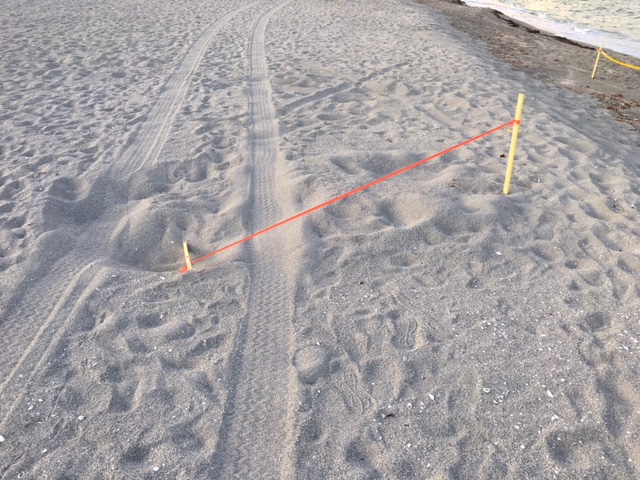Media contacts:
Mote: Hayley Rutger, 941-374-0081, hrutger@mote.org
FWC: Brian Norris, 239-841-9037, Brian.norris@myfwc.com
—
Eight sea turtle nests were run over by a small vehicle – and seven had their marking stakes dislodged – on south Siesta Key, according to a report submitted Friday by Mote Marine Laboratory to the Florida Fish & Wildlife Conservation (FWC), which investigates wildlife law violations.
Mote’s Sea Turtle Patrol found the damage and tracks from a golf cart or all-terrain vehicle (ATV), and they reported that the vehicle had dislodged stakes marking existing nests and driven across a newly laid, unmarked nest.
Sea turtles are protected under federal and state laws as well as local ordinances. Harming sea turtles, their nests or eggs is illegal and can result in serious fines or even jail time.
FWC officers conducted an initial investigation but it was inconclusive due to little additional evidence.
- If you have information about this incident, please call FWC’s wildlife alert hotline: 888-404-FWCC.
“It’s illegal for people to damage, disturb or destroy sea turtle nests, including nest marking materials such as stakes, and the penalties increase for each egg damaged,” said FWC Public Information Officer Brian Norris. “We would appreciate any more information that people can provide, and we also want people to learn from this incident and recognize that sea turtles and their nests are protected under the law.”
While FWC leads wildlife law enforcement in Florida, the nonprofit Mote Marine Laboratory provides independent, scientific monitoring for 35 miles of sea turtle nesting beaches from Longboat Key though Venice.
Upon Mote’s initial inspection, there was no obvious damage to eggs, but it is difficult to assess the damage done to each nest without disturbing the nest further. So Mote scientists may not know the potential impacts on each nest until they hatch.
“We are disappointed to see this kind of destruction – especially to know that it likely took place at night, when the perpetrators could have easily driven over hatchlings or hit a nesting sea turtle,” said Coquina Homer, biological technician at Mote. “We go to a lot of effort to protect sea turtles, which are threatened species. We hope that members of the public learn from this incident and help to ensure that it doesn’t happen again.”
Protect sea turtles on the beach
Sea turtle nesting season officially began May 1 and ends Oct. 31 along southwest Florida beaches. Southwest Florida residents and visitors should follow these turtle-friendly tips:
Do:
• If you encounter a nesting turtle or hatchlings, remain quiet and observe from a distance.
• Shield or turn off outdoor lights that are visible on the beach from May through October — artificial lights visible from the beach can disorient and attract sea turtles, particularly hatchlings that should be crawling toward the water.
• Close drapes after dark.
• Stack beach furniture at the dune line, or ideally, remove it from the beach.
• Fill in holes that may entrap hatchlings on their way to the water.
Do not:
• Approach nesting turtles or hatchlings, make noise, or shine lights at turtles.
• Use flashlights or fishing lamps on the beach.
• Encourage a turtle to move while nesting or pick up hatchlings that have emerged and are heading for the water.
• Use fireworks on the beach.
Do not interfere with sea turtle nests marked with stakes and flagging tape. On Longboat Key through Venice, beachgoers should wait until at least sunrise to set up furniture or equipment. This will allow any new turtle crawls and nests to be documented by Mote scientists. If you see turtle tracks not yet documented by Mote (documented tracks are crossed out with an “X” in the sand), please avoid placing furniture on them and call Mote’s Turtle Patrol at 941-388-4331 to report their location. Tracks marked with small flags have been found by Mote volunteers but are awaiting documentation.
Dogs are not allowed on Sarasota County beaches other than Brohard Paw Park in Venice, where they must be leashed or under voice control, according to county ordinances.


